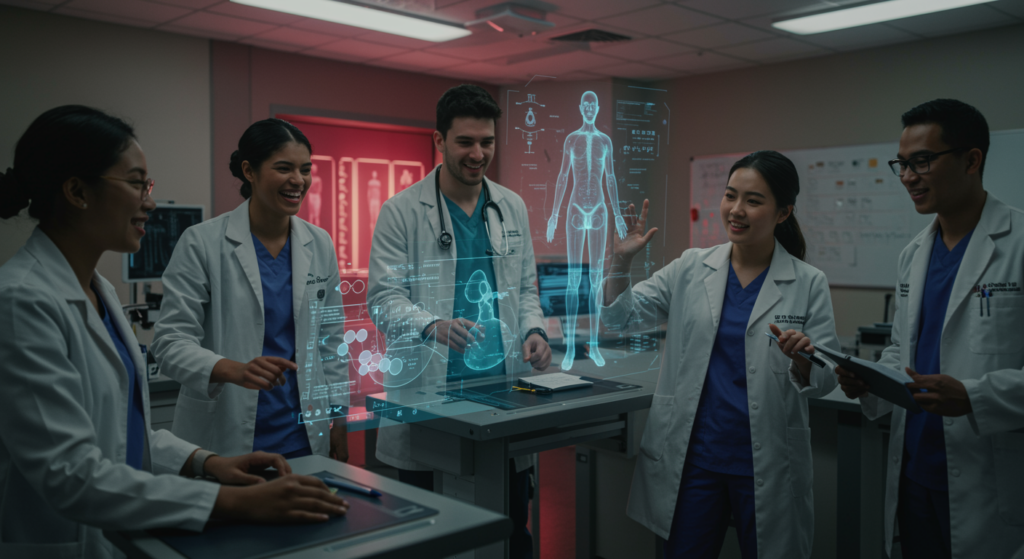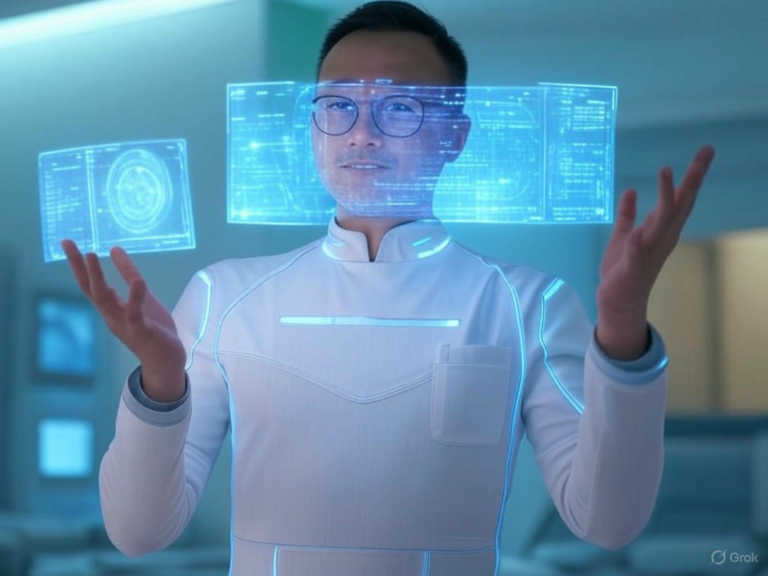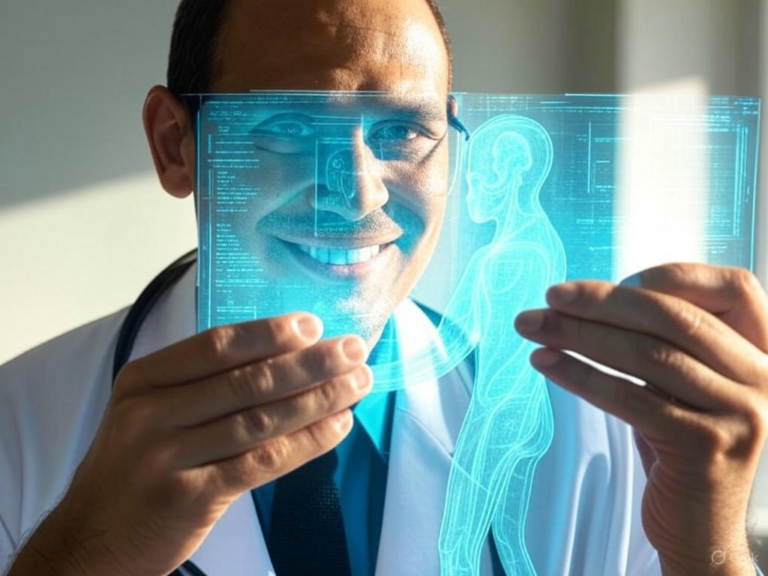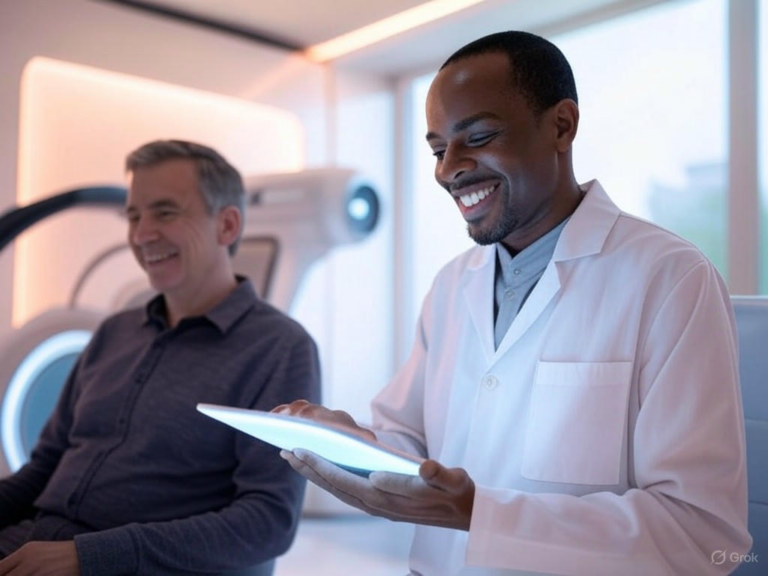
AI Revolutionizes Medical Education
In today’s fast-paced world, AI in medical education is emerging as a game-changer, making learning more adaptive and effective for future doctors. This shift isn’t just about adding tech to classrooms; it’s about creating personalized pathways that help students master complex skills faster. Imagine a system that knows your strengths and weaknesses, guiding you through medical training like a smart, ever-present mentor— that’s the power of AI in medical education right now.
How AI in Medical Education is Transforming Teaching and Learning
Artificial intelligence is turning traditional medical training on its head by providing tools that enhance decision-making and innovation in healthcare settings. It’s not just helping educators craft better lessons; it’s acting as a dynamic partner that adapts to each learner’s needs, making AI in medical education a cornerstone for building competent healthcare professionals. This transformation ensures that students aren’t just memorizing facts but are developing real-world skills that prepare them for modern medicine.
Personalized Learning Experiences
One standout feature of AI in medical education is its ability to deliver customized learning paths. These systems analyze a student’s progress in real time, pinpointing areas for improvement and adjusting content to match their pace. Have you ever wished for a tutor that adapts to your style? That’s exactly what AI offers, making education more engaging and inclusive for diverse learners in medical fields.
As a result, students can dive deeper into challenging topics without getting bogged down by material they’ve already grasped. This approach not only boosts retention but also fosters a sense of ownership over one’s learning journey in AI in medical education.
Enhanced Simulation and Virtual Learning
Virtual simulations powered by AI are giving medical students hands-on experience without the risks of real-life scenarios. These tools recreate complex medical situations, allowing learners to practice diagnoses and treatments in a safe space. A notable study from Johns Hopkins Bayview Medical Center showed that even a few hours of these simulations improved interns’ diagnostic skills dramatically—what if every medical student had access to such realistic training?
This method expands opportunities for practicing rare conditions, bridging the gap between theory and practice in AI in medical education. It’s like having an infinite clinic at your fingertips, ready to simulate any challenge.
Innovative Assessment Methods
AI is revamping how we evaluate medical knowledge through automated systems that provide instant feedback. Gone are the days of waiting weeks for grades; now, AI can spot patterns in responses and highlight misconceptions right away. This real-time insight helps students correct course quickly, turning assessments into active learning tools within AI in medical education.
| Traditional Approach | AI-Enhanced Approach |
|---|---|
| One-size-fits-all curriculum | Customized learning tracks |
| Limited hands-on practice | Endless virtual scenarios |
| Slow feedback loops | Immediate evaluations |
| Resource constraints | Scalable training options |
| Rare case exposure | Diverse simulated experiences |
Key Tools in AI for Medical Education
The tools driving AI in medical education are making knowledge acquisition more intuitive and effective. From diagnostic aids to content creators, these technologies are equipping students with skills that go beyond textbooks. Let’s look at how they’re making a difference in everyday learning.
AI-Assisted Diagnostic Training
AI algorithms are helping students refine their diagnostic skills by analyzing images like X-rays alongside their interpretations. This hands-on comparison builds confidence and accuracy, turning potential mistakes into valuable lessons. In specialties like dermatology, AI in medical education is enhancing pattern recognition, preparing students for accurate real-world decisions.
By practicing with these tools, learners develop a sharper eye for details that could save lives. It’s a practical way to blend technology with human intuition.
Curriculum Development and Content Creation
AI is streamlining curriculum design by scanning the latest research and suggesting updates to keep education current. Educators can use these insights to craft engaging materials, like interactive quizzes tailored to specific student needs. This evolution in AI in medical education ensures that training reflects the ever-changing healthcare landscape, keeping programs fresh and relevant.
Imagine generating case studies at the click of a button—AI makes it possible, saving time and improving quality. For students, this means more dynamic resources that align with their learning goals.
Research Assistance and Knowledge Management
AI tools are simplifying research for medical students by quickly sifting through vast datasets and highlighting key findings. This efficiency allows learners to focus on analysis rather than data collection, fostering deeper understanding. When it comes to sharing discoveries, AI writing aids can translate complex information into accessible formats, a boon for AI in medical education.
These capabilities not only speed up projects but also teach students how to communicate science effectively. What could you achieve with such powerful support in your studies?
Challenges and Ethical Considerations in AI for Medical Education
While AI in medical education offers exciting benefits, it’s not without hurdles. Issues like data accuracy and potential biases demand careful attention to maintain high standards. Let’s explore these challenges and how to navigate them thoughtfully.
Quality and Reliability Concerns
One major worry is the risk of misinformation from AI systems trained on imperfect data. Institutions must implement rigorous checks to ensure reliability, preventing any propagation of errors in medical training. This scrutiny is vital for upholding the integrity of AI in medical education.
By validating AI outputs against trusted sources, educators can build trust and enhance learning outcomes. It’s about using technology wisely to support, not supplant, expert knowledge.
Ethical and Legal Implications
Privacy and academic integrity are key ethical issues when integrating AI. Policies must protect patient data and promote honest use, especially in assessments. Navigating these in AI in medical education requires a balance between innovation and responsibility.
For instance, how do we ensure AI enhances learning without compromising originality? Clear guidelines can help address this.
Balancing Technology and Human Elements
There’s a risk that over-relying on AI might diminish essential skills like empathy and critical thinking. Medical education should integrate AI as a supplement, not a replacement, to preserve these human aspects. In AI in medical education, the focus remains on nurturing well-rounded professionals.
Think of AI as a co-pilot in training—it’s there to assist, but the human touch drives true connection. Striking this balance is crucial for effective learning.
Future Trends in AI and Medical Education
Looking ahead, AI in medical education is set to evolve even further, blending with emerging technologies for richer experiences. From adaptive systems to collaborative simulations, the possibilities are thrilling. What innovations might we see next?
Integration with Extended Reality Technologies
Combining AI with VR and AR could create ultra-immersive training environments where students practice procedures with real-time guidance. This fusion promises to make learning more lifelike and effective. In AI in medical education, such advancements could revolutionize how we prepare for clinical challenges.
Adaptive Curriculum Systems
Future AI setups might adjust curricula on the fly based on student data, offering truly responsive education. This means lessons evolve to meet individual needs, optimizing outcomes in real time. It’s a step beyond personalization in AI in medical education, towards proactive learning.
Interprofessional Education Enhancement
AI tools are facilitating team-based training across disciplines, simulating scenarios that require collaboration. This prepares students for multidisciplinary healthcare roles, enhancing overall readiness. Through these simulations, AI in medical education is fostering the teamwork essential for modern medicine.
Equipping Students for an AI-Driven Healthcare World
Beyond tools, AI in medical education must teach students to collaborate with technology in practice. This involves building AI literacy and ethical awareness to ensure safe, effective use. How can we make sure future doctors are tech-savvy yet human-centered?
AI Literacy for Healthcare Professionals
Understanding AI’s strengths and limits is now a core skill. Programs like those at Harvard Medical School are incorporating this into curricula, helping students navigate biases and applications. In AI in medical education, this literacy empowers clinicians to leverage tech wisely.
Human-AI Collaboration Skills
Learning to work alongside AI means knowing when to trust its insights and when to question them. This skill set blends technology with clinical judgment, a must for tomorrow’s healthcare. It’s about creating a partnership that elevates patient care through AI in medical education.
Wrapping Up: Embracing the AI Era in Medical Education
The rise of AI in medical education mirrors the internet’s impact years ago—starting as a novelty and becoming essential. As one expert put it, it’s evolving from experimentation to a vital part of training. With personalized learning and better simulations, we’re setting up the next generation for success.
Despite challenges, the advantages are clear, from enhanced skills to ethical preparedness. If you’re in healthcare or aspiring to be, consider how AI could transform your path—what steps will you take next?
We’d love to hear your thoughts on this exciting shift. Share your experiences in the comments, explore more on our site, or connect with us for deeper insights. Let’s keep the conversation going!
References
- Ellaway, R. (2024). Artificial Intelligence in Medical Education: Transforming Learning and Practice. Cureus Journal.
- Harvard Medical School. (2024). How Generative AI is Transforming Medical Education. HMS Magazine.
- Other sources: As referenced in the text, including studies from PMC and Taylor & Francis; full list available upon request.
AI in medical education, artificial intelligence healthcare education, medical training technology, virtual patient simulations, AI-driven learning, personalized medical education, AI tools in healthcare, innovative assessment methods, virtual simulations in medicine, future of medical learning







